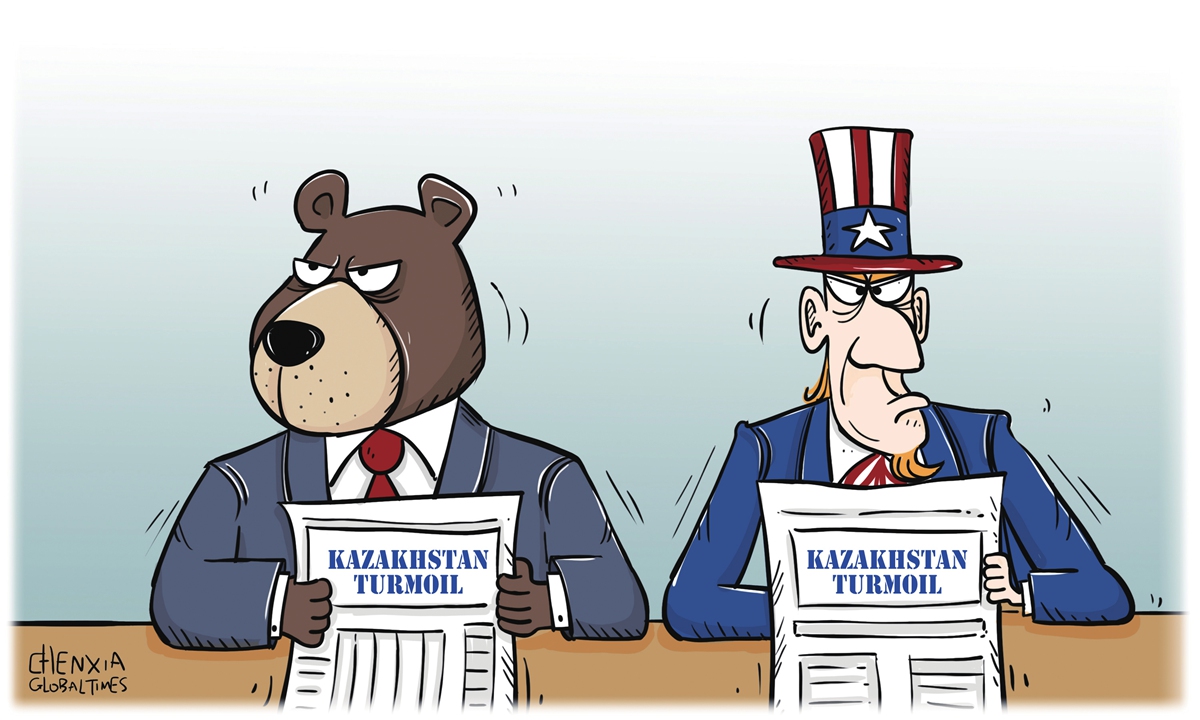
Yesterday we marked the anniversary of the attack on the U.S. Capitol. The U.S. Department of Justice issued yet another strong statement, saying that all parties responsible will be punished harshly. We know that some of the participants of the attack are already serving their sentences — up to five years in prison — while in total more than 700 people have been arrested and are now awaiting their hearings.
Meanwhile, the reaction of the U.S. to the bloody events in Kazakhstan is exactly the opposite: This, as they say, is the people’s will, a protest against dictatorship, all hail freedom. Their reaction, however, is quite tame — and later I’ll explain why.
American media have completely lost not only their objectivity, but also their basic sense of reality. Both Reuters and CNN claim that Russian troops are killing the insurgents. As a matter of fact, they started reporting this long before the Collective Security Treaty Organization’s peacekeepers embarked on their planes bound for Kazakhstan. There can be no proof that our military is dispersing the looters — CSTO’s troops were given a different task.
Generally, the United States’ loud statements cannot even be considered double standards anymore, to which we are already more or less accustomed. The Russian language has a fitting expression — “Hottentot morality,” a term that doesn’t meet the standards of Western political correctness anymore. In our language, however, for decades it meant this standard of morality: “If I stole a cow from my neighbor, that’s good; if he stole my cow, that’s bad.” The term “Hottentot morality” is overdue to be renamed “American morality.” Everything that benefits the U.S. is termed good, and everything that harms the U.S. or doesn’t go its way is considered bad.
Take note that the U.S. media are, as usual, lying about the “valiant insurgents” when talking about the events in Kazakhstan, while U.S. politicians abstain from any strong statements. Why? That’s simple: Many Kazakh oil production plants are owned by Western businesses. That’s why truly serious unrest, not to mention a change in who holds power, is unprofitable for the Americans. What is profitable, however, is to remind the entire world that unrest can be sparked even in the most stable country.
To clarify, the U.S. needs the Capitol attack to be forgotten as soon as possible, lost in the haze of mass protests across the globe. A year ago, this attack became the moment of the United States’ greatest disgrace (as of now). The Americans, compromising stability in other countries of the world for decades, now watched with horror as the same thing unfolded in their own capital. The cause of political upheaval has turned into an object of it.
So, naturally, any unrest in any other country is like a load off American shoulders. The sooner the Capitol attack is forgotten, the sooner the participants in it are put in jail, the easier it will be for the U.S. to assume its usual proud stance as a global policeman and to condescendingly lecture others to “refrain from violence” and to “respect the protesters’ demands.”
How can Russia oppose “American morality”? With our own Russian morality. First, this means upholding universal principles: Any use of force against legitimately elected authorities is a crime and must not be supported from abroad. The Donbass insurgents, as a reminder, stood up against those who claimed authority as the result of a coup, and who time and again breached the signed Minsk Protocol afterwards.
Secondly, any external intervention is only possible after the official request from the legitimate authorities. Such was the case in Syria, and it is now happening in Kazakhstan.
Respecting sovereignty, national traditions, simply respecting others — that’s Russian morality. It’s more than enough to show the international community that a force can be good, and Russia is this good force. Especially in comparison to the U.S., which has lost its wits completely, and Europe, incapable of independent policies.
In Kazakhstan, I’m sure, order and peace will soon be restored. Our “polite people” are already there, and with their support Kazakh law enforcement will recover from the shock of a surprise attack and overcome the terrorists. However, the ease with which one of the most stable post-Soviet states has been plunged into anarchy is a serious reason to radically reconsider the approach to ensuring safety for all countries of the world. Russia could help many with that — of course, not forgetting its own interests.

Leave a Reply
You must be logged in to post a comment.